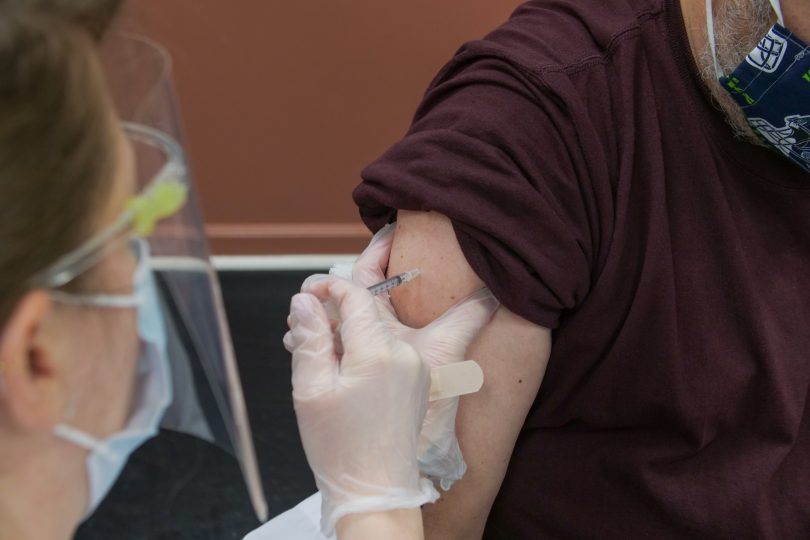By James Paleologopoulos
Boston University News Service
BOSTON – People over the age of 65, low-income senior housing staff and people with two or more eligible health conditions, including asthma, will be able to book appointments for the COVID-19 vaccine this week.
Members of “Group 2” of phase 2 can start reserving vaccinations on Thursday, Feb. 18, with some 70,000 appointment slots opening up for registration tomorrow, according to Gov. Charlie Baker.
In a press conference, Baker said the group would represent “approximately 1 million people” living in Massachusetts while indicating it may be months before all of those affected can get a shot due to the federal government’s limited supplies.
Part of the group includes individuals over the age of 65, as well as residents and staff of low-income and affordable public and private senior housing. The other half is made up of residents over the age of 16 who have two or more of the medical conditions listed by the Massachusetts Department of Public Health.
The conditions include:
- Asthma (moderate-to-severe)
- Cancer
- Chronic kidney disease
- COPD (chronic obstructive pulmonary disease)
- Down Syndrome
- Heart conditions, such as heart failure, coronary artery disease, or cardiomyopathy
- Immunocompromised state (weakened immune system) from solid organ transplant
- Obesity and severe obesity (body mass index [BMI] of 30 kg/m2 or higher)
- Pregnancy
- Sickle cell disease
- Smoking
- Type 2 diabetes mellitus
While the information on the latest group became clear in January as the Baker administration detailed more of the vaccination timeline, “asthma” was initially missing from the list of eligible comorbidities.
Its absence from the eligibility list caught the attention of residents, health advocates and lawmakers, resulting in petitions and calls for its inclusion from almost every level of government.
The chronic, inflammatory condition known for affecting the airways of the lungs is believed to affect 1 in 9 residents, with a higher prevalence among Black, Hispanic and non-Hispanic residents, according to the state’s Bureau of Community Health and Prevention.
Baker indicated last week, during another press conference, that he was aware of the absence and noted work was being done. On Wednesday, he described how the Center for Disease Control and Prevention guidelines informed the state’s initial list of comorbidities, including cancer, sickle cell disease and type 2 diabetes.
However, he indicated the state would be breaking away when it comes to prioritizing asthma, as the CDC only indicated those with moderate-to-severe asthma only “might be at an increased risk” for COVID-19.
“The main reason we did this… and sort of went away from the CDC guidelines… it really is an environmental and economic justice issue,” Baker said while answering questions from reporters. “There are tons of studies that have been done that demonstrate that at-risk communities and communities of color have historically had higher rates of asthma, child asthma, adult asthma.”
“A lot of that has to do with decisions that were made years ago with respect to how people chose to build neighborhoods and communities, and it’s a legitimate issue,” Baker said. “We view that as much as an equity issue as a medical issue.”
As noted in state guidelines, individuals with asthma must have at least one other eligible condition to receive the vaccine.
Baker also listed the latest vaccination numbers, describing how providers administered 285,000 total doses last week, which exceeded the weekly shipments of vaccines provided by the federal government. A total of 1.1 million doses have been administered in Massachusetts so far.
Secretary of Health and Human Services Marylou Sudders estimated Massachusetts had been receiving 110,000 doses a week, but the state saw a “modest” increase of 29,000 doses arrived on Tuesday night.
“For next week, we will have 139,000 first doses… the first very modest increase in a long time,” Sudders said.
The increase in vaccinations arrived just as the DPH confirmed the state’s first case of the “South Africa COVID Variant.” In a press release, the department indicated that a woman in her 20s who lives in Middlesex County was found to have the B.1.351 variant but had not traveled.
Known for spreading easily, the strain is one of two that have been detected in Massachusetts. The B.1.1.7 variant, first identified in the United Kingdom, has also been found in the state, with the DPH tracking at least 34 cases.





